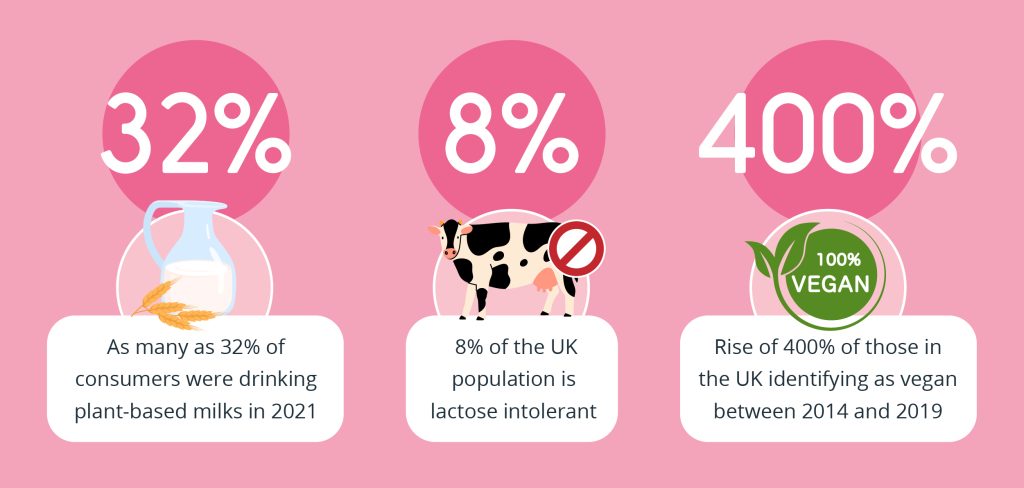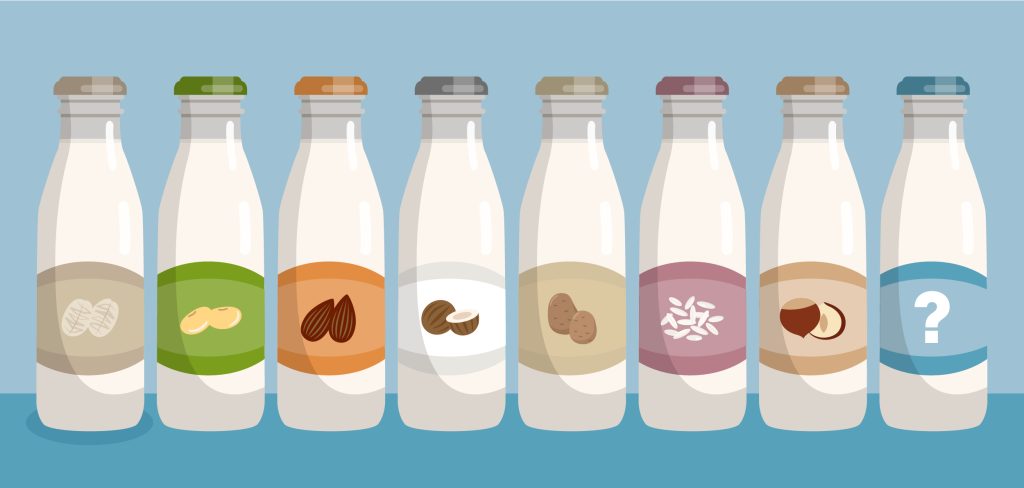There are many reasons why users of your coffee machine may not want to have cow’s milk in their drinks.
Veganism has grown increasingly popular in recent years – The Vegan Society reported a rise of 400% of those in the UK identifying as vegan between 2014 and 2019, rising from 0.25% of the population to 1.21%, with further research suggesting that this figure has now risen to 4%.

Meanwhile, it is estimated that 8% of the UK population is lactose intolerant, while a significant group of people want to reduce the amount of dairy they are consuming for more general health reasons. There are also concerns regarding the effects of mass dairy farming on the environment.
Add that all together, and it’s no surprise that a 2021 report in The Guardian suggested that as many as 32% of consumers were drinking plant-based milks, up from 25% the previous year.
If you haven’t tried any of the common milk alternatives, you might be wondering how they differ from cow’s milk and which you might want to make available in your coffee machine. Here’s our guide to the leading contenders.

Oat milk
Now the most popular plant-based milk in the UK, sales of oat milk have rocketed in recent years.
Pros: With a creamy consistency, a natural sweetness and a taste that is probably closest to cow’s milk, oat seems to go most naturally with hot drinks, especially coffee. It is particularly good for steaming before being added to coffee, while it is also good with porridge, cereal and milkshakes. It’s also probably the most sustainable of the most popular plant-based milks, as it is easily grown in cooler climates (avoiding deforestation issues) and uses considerably less water (less than a sixth of what is needed for almonds).
Cons: Compared to most of the other alternatives, oat milk is low in vitamins, minerals and protein.
Soya milk
The original and for many people still the plant-based milk of choice, especially in tea.
Pros: Soya milk contains roughly the same levels of protein as cow’s milk, and is also high in amino acids, antioxidants, fibre and nutrients, but has roughly half the calories, carbohydrates and fats. Most of the major brands available tend to be fortified with calcium.
Cons: Soya milk often splits when added to coffee, and while this doesn’t significantly affect the taste, it does give the drink an off-putting appearance. Steaming it beforehand will certainly help. You also need to be careful with where the soya beans have been cultivated, as they have been associated with deforestation in many cases.
Almond milk
Almond milk has a nutty taste and a watery consistency and was first used as a milk substitute as far back as the Middle Ages.
Pros: Almond milk is one of the healthiest options, containing no cholesterol or saturated fats and being naturally high in many vitamins and minerals. It also has considerably fewer calories and carbohydrates than cow’s milk. It is particularly good for use in lattes and cappuccinos.
Cons: Almonds need huge amounts of water to grow, and some varieties are cultivated in parts of the world where water is a particularly precious resource, so you need to be careful about where you’re buying it from. It is lower in protein than soya milk, which means it’s not so great for steaming and foaming. Like soya milk, almond milk has a tendency to curdle in coffee, but it is also prone to curdling in tea.
Coconut milk
Coconut milk in this context is made from the white flesh and is not the same as the coconut milk you buy in tins for use in cooking.
Pros: Coconut has a rich and creamy texture that makes it the perfect addition for coffee (although not so much for tea). It is high in vitamins and minerals, including Vitamin D, Vitamin B12 and calcium. Delicious when used with dark, chocolatey coffee beans, in masala chai and in hot chocolate.
Cons: Coconuts are high in fat and calories, and represent one of the pricier alternative milk options. And as they can only be grown in tropical climates, there are serious concerns surrounding whether they can be sourced ethically – look out for the Fair Trade symbol if you want to offer your customers an ethical milk.
The above may be the most commonly found alternative milks in supermarkets, but here are some newcomers you may see crop up more and more:
Potato milk
Potato milk is likely to grow in popularity as it has just the right consistency and texture for use in coffee. And it doesn’t taste of potatoes – in fact, it doesn’t have a strong taste at all, making it great for use with flavoursome coffees without affecting the taste.
Rice milk
If you’re looking for the least problematic alternative milk for those with allergies, then rice is the one, but the flip side is that it has perhaps the highest negative impact on the environment (although it is still far ahead of dairy milk).
Hazelnut milk
More environmentally friendly than almond milk, but with many of the same uses and nutritional benefits, hazelnut milk’s flavour might be a bit strong for some coffees, but is great with strong tea. It won’t curdle when added to a hot drink.
Here at Nu Vending, we don’t just supply, install and maintain some of the very best vending machines and coffee machines available in the UK, we can stock them with the teas, coffees and milks of your choice to meet the needs and demands of your staff and customers. That can include a range of milk alternatives so that the vegan, lactose intolerant and environmentally conscious can enjoy a healthy, guilt-free and tasty tea or coffee at any time.
Contact us now to discover more.




















